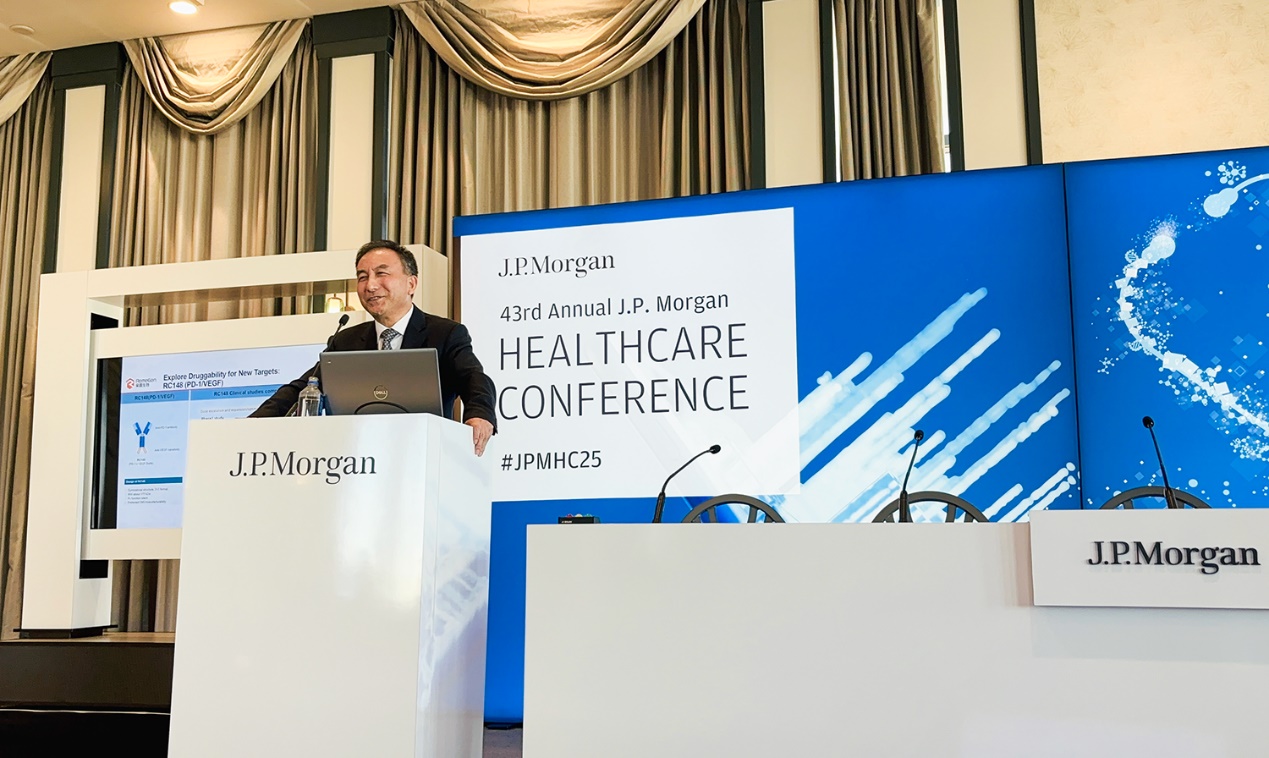On 17 January, 2025 (GMT+8), Dr. Jianmin Fang, Chief Executive Officer of RemeGen Co., Ltd. (“RemeGen”), delivered a keynote speech at the 43rd Annual J.P. Morgan Healthcare Conference, highlighting recent breakthroughs made by RemeGen under the strategy of "addressing highly unmet medical needs through continuous development of original biologics" and introducing the company's latest technological innovations and plans for the future.

Development of Next-Generation New Molecules of Potential FIC/BIC
RemeGen has been dedicated to discovering and engineering novel molecules with the potential to become first-in-class (FIC) or best-in-class (BIC) drugs via its four self-established pillar technology platforms, namely the fusion protein platform, the bispecific antibody platform, the antibody-drug conjugate (ADC) platform, and the bispecific ADC platform. At the conference, Dr. Fang presented RemeGen’s latest drug candidate, RC278, an ADC targeting a novel tumor antigen with potential to become a FIC/BIC drug. It combines a humanized monoclonal antibody with Topoisomerase 1 (Topo1)-based payloads via cleavable linkers using the site-specific conjugation technology, and has a drug-to-antibody ratio of 8. Its unique design and mechanism of action position it a potential therapeutic option for solid tumors with enhanced safety and efficacy profiles. Currently, RC278 is in the preclinical phase and it is expected to file an Investigational New Drug (IND) to China’s National Medical Products Administration (NMPA) in the first half of 2025.
Autoimmune Diseases: Maximize Commercial Potential of Telitacicept Through Indication Expansion
RemeGen is actively expanding the indications of Telitacicept to maximize its commercial potential, with several milestones anticipated to be achieved in 2025.
Telitacicept is a potential blockbuster drug for B cell-mediated autoimmune diseases. The ongoing attempt aims to step up its competitive edge.
•The phase III clinical trial (NCT05737160, Study ID: 18C029) on myasthenia gravis (MG) in China has reached its primary endpoint ,and it is expected to get approval by NMPA in the second quarter of 2025. According to Frost & Sullivan, there are approximately 1.2 million MG patients globally, with 220,000 in China. The global market size is reported at US$7.24 billion by 2030.
•Enrollment of the phase III clinical trial (NCT05799287, Study ID: 18C021) on IgA Nephropathy (IgAN) in China has been completed and the data as of Week 36 is expected to be read out in the first half of 2025. According to Frost & Sullivan, there are about 10.2 million IgAN patients globally, with 2.37 million in China. The global market size is reported at US$2.5 billion by 2030.
•Enrollment of the phase III clinical trial (NCT05673993, Study ID: 18C022) on primary Sjögren's Syndrome (pSS) in China has been completed and the data as of Week 24 is expected to be read out in the first half of 2025. According to Frost & Sullivan, there are approximately 4.28 million pSS patients globally, with 650,000 in China. The global market size is reported at US$6.1 billion by 2030.
In China, Telitacicept has been approved for the treatment of Systemic Lupus Erythematosus (SLE) and Rheumatoid Arthritis (RA) with positive effectiveness observed in clinical settings, a Biologics License Application (BLA) submission for MG has been accepted by NMPA, and a phase III clinical trial is currently ongoing for neuromyelitis optica spectrum disorder (NMOSD). For the global study, global multicenter phase III studies on MG, SLE, pSS, and IgAN are progressing as planned. Furthermore, multiple indications such as Lupus Nephritis and Membranous Nephropathy are at different phases of clinical trials. The indication expansion of Telitacicept will significantly increase its potential market share and benefits more patients.
Oncology: Multidimensional Approach for Therapy Innovation and Flourishing Pipelines
In oncology, RemeGen is laser-focused on solid tumors and pursues therapeutic innovation through expanding indications of its approved drugs, exploring the druggability of new targets, and evaluating new combination therapies.
Currently, several clinical trials on Disitamab Vedotin (RC48) are proceeding for the purpose of indication expansion, including: a phase III clinical trial (NCT05302284, Study ID: RC48-C016) on a RC48-based combination therapy as a first-line treatment option for locally advanced or metastatic urothelial cancer (la/mUC) with data expected to be read out in the first half of 2025; a phase Ib/II clinical trial (NCT04264936, Study ID: RC48-C014) on RC48 combined with Toripalimab as a first-/second-line treatment for la/mUC; a phase II clinical trial (NCT05297552, Study ID: RC48-C017) on RC48 combined with Toripalimab as a neoadjuvant therapy for muscle-invasive bladder cancer with encouraging preliminary results released; studies on various RC48-based treatment options designed for gastric cancer patients with different HER2 expression status; a phase III clinical trial (NCT03500380, Study ID: RC48-C006) that demonstrated clinically meaningful efficacy of RC48 as a second-line therapy among patients with HER2-positive breast cancer with liver metastasis; and a phase II clinical trial (NCT06642545, Study ID: RC48-C036) on RC48-based combination therapies as first-line treatment options for HR-/HER2-low unresectable locally advanced or metastatic breast cancer.
RemeGen is also making active efforts to explore the therapeutic potential of ADC in combination with PD-1 inhibitors, chemotherapy, or bispecific antibodies, looking forward to address challenges brought about by traditional treatments.
The druggability of new targets is another key area of interest for RemeGen, and researches on several new targets, though underway, have yielded encouraging preliminary results. RC88, a novel mesothelin-targeted ADC with the potential to become a FIC drug, has received Fast Track Designation from the U.S. Food and Drug Administration (FDA) in January 2024. RC118, a CLDN18.2-targeted ADC, has demonstrated a clinically meaningful objective response rate in CLDN18.2-positive gastric cancer patients who have received multiple lines of treatment. A phase II clinical study (NCT06038396, Study ID: RC118-C002) of RC118 in combination with PD-1 inhibitors or RC148 are currently recruiting patients.
Ophthalmology: Clinical Studies on RC28 Running Smoothly with Potential to Resolve Bottlenecks
RC28 is a VEGF/FGF dual-targeting fusion protein developed by RemeGen for ophthalmic diseases with the potential to become a FIC drug. The clinical trials involving RC28 include a phase III study (NCT05885503, Study ID: 28C005) on the diabetic macular edema (DME) for which the enrollment has been completed in the first quarter of 2024 with BLA submission expected to be filed to NMPA in the second half of 2025, a phase III study (NCT05727397, Study ID: 28C004) on the wet age-related macular degeneration (wAMD) for which the enrollment has been completed in 2024 with BLA submission expected to be filed to NMPA in the first half of 2026, and a phase II study (NCT04782128, Study ID: 28C003) on diabetic retinopathy (DR) which was completed in 2024.
Robust Growth and Improved Efficiency
In 2024, RemeGen stepped up efforts in commercialization, research and development, and innovation, enabling a more coordinated business operation. Its accelerated commercialization has driven a robust revenue increase since 2022. According to its performance estimation for 2024, RemeGen generated a total of 1.715 billion CNY from its business, a year-on-year increase of 58%, and saw a reduction of 41 million CNY in loss.
Specifically, the successful sales team building and increased market coverage have facilitated a sustainable ramp-up in sales of RemeGen’s two core products, i.e. Telitacicept (Tai Ai®, RC18) and Disitamab Vedotin (Aidi Xi®), ensuring a stable cash flow for the company to support research and development.
Telitacicept, a first-in-class Blys/APRIL fusion protein, has saw continuous market share increment since its approval for SLE and RA in China. Its sales in the third quarter of 2024 experienced an impressive year-on-year increase of 80%. By the end of September 2024, Telitacicept has been listed by over 1000 hospitals in China, available for prescription by around 25,000 physicians. With the expected approval of new indications, Telitacicept will further expand its market presentation and become a cornerstone in the treatment of B cell-mediated autoimmune diseases.
Disitamab Vedotin is China’s first homegrown ADC drug that has been granted approval by NMPA. It holds an important position in the oncology treatment market in China. Disitamab Vedotin has been approved as a second-line treatment option for HER2-positive urothelial cancer and a third-line treatment option for gastric cancer. By the end of September 2024, Disitamab Vedotin has been listed by over 800 hospitals in China, available for prescription by around 25,000 physicians. As multiple clinical trials designed to move the drug to a more front line are running smoothly, it is anticipated that Disitamab Vedotin will cover more patients, consolidating its advantage in the market of HER2-expressing urothelial cancer treatment.
In addition to Telitacicept and Disitamab Vedotin, RemeGen has six proprietary new drug molecules in clinical-trial stage, with over 30 studies ongoing.
Conclusion
2024 is a year of remarkable achievements for RemeGen. Telitacicept was approved in China for the treatment of RA. NMPA accepted the BLA submission of Telitacicept for MG and Disitamab Vedotin for HER2-positive breast cancer with liver metastasis. Additionally, the milestone of first-patient-in was achieved for the global multicenter phase III clinical trial on Telitacicept in treating MG, and multiple clinical studies of Disitamab Vedotin were proceeding as planned.
2025 is a year of hope for RemeGen. Approval is expected to be granted by NMPA to Telitacicept for MG and to Disitamab Vedotin for HER2-positive breast cancer with liver metastasis. Furthermore, 5 BLA submissions will be filed in China, including two for Telitacicept in treating IgAN and pSS, two for Disitamab Vedotin in treating HER2-expressing urothelial cancer as a first-line treatment option and HER2-low breast cancer, and one for RC28 in treating diabetic macular edema.
In the future, RemeGen will continue to take innovation as the key driver of growth, optimize its R&D and commercialization strategies, and work towards its vision of providing more effective innovative therapeutic options for patients worldwide as a leading biopharmaceutical company with rich pipelines, strong R&D capability and proficient business development expertise.
